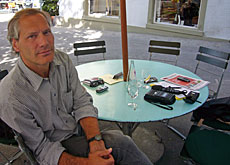
“Nation’s integrator” backs the Basel model

Thomas Kessler, in charge of integration in canton Basel City, tells swissinfo about the need for businesslike and humane integration policies.
The integration model in Basel is considered one of the most progressive in Switzerland, but Kessler says nobody can place themselves above the Swiss constitution and democratic system thanks to a zero tolerance policy.
swissinfo: Whenever the politics of integration is mentioned, your name crops up. You are the de facto integrator of the nation. Did you look for this role?
Thomas Kessler: I looked for the integration theme and I am pleased to present it at a national level. I consider it ultimately to be a project of Switzerland, of the whole country. To communicate this I am happy to be in the spotlight, because in Switzerland we must find majorities for a modern policy.
swissinfo: Do you have contact with foreigners in general or only with the “difficult” sections of society?
T.K.: We reach out not only to problem groups, but also the many forgotten highly qualified elite migrants. They are the majority and also have their needs, although they are different. It is also worth our while to disseminate information here.
swissinfo: National elections take place this autumn. One of the hottest election campaign topics is integration. Do political parties use you or try to get you on board?
T.K.: I can say clearly say no, because I represent the public position and that is open to examination at any time. No party can corrupt me because their attitudes are already defined. It is more the other way around: the parties can follow our line. If one follows the debate, one can see that more and more parties take on the Basel model.
swissinfo: The rightwing Swiss People’s Party is planning an initiative to deport foreigners who commit crimes along with their families and strips them of their citizenship. Is that the right way to go?
T.K.: The People’s Party has turned the subject around for tactical reasons for the election. This is a way for political marketing to cultivate frustrations, but it has nothing to do with integration and our politics. We do exactly the opposite by steering the process from the beginning and not from the end.
Switzerland already has some of the highest hurdles to naturalisation and one of the longest [qualifying] periods in the world. One can increase the hurdles and extend these periods endlessly, but it does not solve any problems. This People’s Party aggravation is not necessary because the existing laws to deport criminals are quite sufficient. We also consistently apply this in Basel. We deport 20-40 people a year without needing new laws.
swissinfo: The Basel model talks of contracts that are linked with migration and stipulates language courses. Can integration be forced?
T.K.: We protect people from isolation with these contracts. It is a misunderstanding if education is considered to be unpleasant or discriminating. Discrimination is isolation and lack of access to education.
We plan contracts with people who for cultural or social reasons live in isolation, for example because the husband from a patriarchal society determines who can enjoy an education and who may not. That fundamentally contradicts our concept of equality. For many women this is the first step to emancipation, to release them from their obligations.
swissinfo: Is the issue of foreigners less serious in the eyes of people in Basel than in other cantons?
T.K.: We evaluate what the population thinks every two years. Two-thirds regard the topic as important but they also see problems. Over the years the positive portion has increased because people have more confidence with official policy. People don’t speak these days of a general problem with foreigners, but differentiate between problems of education, violence, society and health.
swissinfo: Can criminal statistics prove that the Basel measures works?
T.K.: If we compare young men who went to school in Switzerland, in 1998 foreign citizens were behind approximately 60 per cent more delinquency than Swiss. Today the difference is 20 per cent.
swissinfo: Is there genuine equal opportunity for foreigners or is wishful thinking?
T.K.: Equality as the highest goal of a liberal state is Utopian, because people do not come into the world the same and grow up the same. One can only try to manufacture optimal equality.
swissinfo: How do you strike the balance between adjustment and retaining traditions? How far should a state’s tolerance go?
T.K.: Switzerland has it easy on this point because it defines itself purely politically and not culturally. Our culture is direct democracy. There is zero tolerance for people who try to lift themselves above democracy. Swiss society is always adapting thanks to migration.
swissinfo-interview: Gaby Ochsenbein
Basel’s integration office was opened in 1998 and has promoted the integration of immigrants through a variety of actions.
These include cultural mediators, “coaches” for apprentices, sporting tournaments under the fair-play banner, language courses and information for new immigrants.
The office also registers discrimination complaints filed by immigrants.
Around 187,000 people live in canton Basel City, of whom 58,000 are foreigners, coming from more than 150 countries.
Thomas Kessler has been coordinator for questions relating to migration and integration for the cantonal government in Basel City since 1998.
Kessler was born in 1959 and grew up in western Switzerland and in canton Zurich.
From 1987-1991 he represented the Green Party for Zurich cantonal parliament.
From 1991-1998 he was a delegate looking at drugs for canton Basel City.
Since 1996 he has been on a federal commission for drugs issues and since 1998 he has been a delegate for migration and integration for canton Basel City.

In compliance with the JTI standards
More: SWI swissinfo.ch certified by the Journalism Trust Initiative






























You can find an overview of ongoing debates with our journalists here . Please join us!
If you want to start a conversation about a topic raised in this article or want to report factual errors, email us at english@swissinfo.ch.